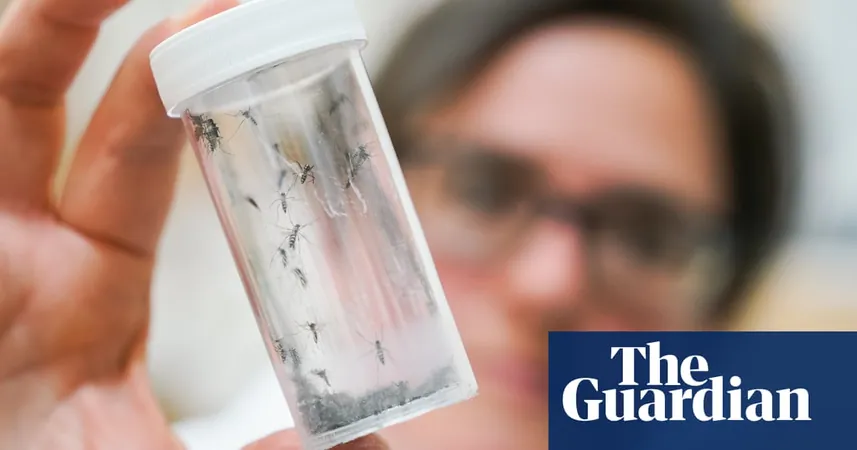
Medical Schools in Europe to Emphasize Training on Climate-Related Diseases Amid Growing Health Concerns
2024-10-14
Author: John Tan
Introduction
In a groundbreaking move, medical schools across Europe are set to enhance their curricula to better prepare future doctors for the health challenges looming due to the climate crisis. This initiative comes as mosquito-borne diseases like dengue and malaria are projected to become more prevalent in temperate regions, forcing educators to rethink how they train the next generation of physicians.
European Network on Climate & Health Education (Enche)
The European Network on Climate & Health Education (Enche), spearheaded by the University of Glasgow, will see the integration of climate-centered lessons into the medical training of over 10,000 students from 25 institutions in countries such as the UK, Belgium, and France. Dr. Camille Huser, co-chair of the network, emphasized that future doctors will encounter an array of diseases that are not currently part of their training. "They need to be aware of that so they can recognize them," she stated.
Need for Urgent Education Shift
This urgent shift in education comes in the wake of what has been declared Europe’s hottest summer on record, where extreme weather conditions and rising temperatures are stressing healthcare systems. Changes in weather patterns have facilitated the movement of disease-carrying insects into new territories, heightening the risk of infectious diseases. Additionally, chronic ailments like cancer, diabetes, and mental health disorders are increasingly influenced by climate variability and pollution.
Current State of Medical Education
Currently, only a limited number of medical schools incorporate climate-related content into their curricula, often restricted to just a single lesson or module. The creators of Enche envision a more holistic approach where climate education is woven throughout medical training. Dr. Huser pointed out that while climate change may not introduce entirely new diseases, it intensifies the existing health conditions. For instance, the complications of diabetes can worsen in a world affected by climate change.
Focus on Antimicrobial Resistance and Sustainable Practices
Moreover, the challenge of antimicrobial resistance—where pathogens evolve to resist treatment—is also tied to climate crises, necessitating this critical subject to be included in medical education. Upcoming doctors will also learn the importance of promoting sustainable practices like active transportation (favoring walking and cycling over driving) and "green prescribing," which involves encouraging patients to engage in health-improving activities like community gardening.
Health Benefits and Emissions
Dr. Huser highlighted the dual benefits of this preventive approach: it not only enhances individual health but could also significantly lower healthcare emissions. Alarmingly, the healthcare sector is responsible for greenhouse gas emissions similar to or exceeding those of the aviation industry. "When you fly somewhere, you feel guilty, but visiting a doctor often doesn't provoke the same self-reflection," she noted.
Changing Management Strategies
The teaching will also focus on how altered management strategies for conditions like asthma can lessen environmental impacts. For example, by managing asthma effectively, patients reduce their reliance on inhalers, thereby decreasing associated emissions. Some patients might even transition to using dry powder inhalers, which have a lower carbon footprint.
A Coordinated Effort
Despite some existing initiatives at individual institutions, this is the first coordinated effort to integrate climate education consistently within undergraduate medical training across Europe. The network also aims to influence the policymakers responsible for national medical curricula, ensuring that education regarding the climate crisis becomes integral to the training of all medical professionals.
Foundational Discussions on Climate Change
Co-chair Professor Iain McInnes echoed this sentiment, stating that discussions surrounding climate change should become as foundational to medical training as other critical health issues like obesity and smoking. He described climate education as essential to the core identity of a doctor.
Support from WHO and Private Sector
Supporting this initiative is the World Health Organization (WHO), alongside several major pharmaceutical and healthcare companies, such as AstraZeneca and GSK, as part of the Sustainable Markets Initiative Health Systems Task Force. This public-private partnership aims to facilitate the decarbonization of healthcare systems.
Role of Enche in Global Consortium
Enche will serve as a regional hub for the Global Consortium on Climate and Health Education (GCCHE) hosted by Columbia University’s School of Public Health. Professor Cecilia Sorensen, director of GCCHE, emphasized the importance of regional networks in addressing climate and health challenges that are unique to the communities they serve, underlining the critical need for tailored solutions as climate change affects health on a global scale.

 Brasil (PT)
Brasil (PT)
 Canada (EN)
Canada (EN)
 Chile (ES)
Chile (ES)
 España (ES)
España (ES)
 France (FR)
France (FR)
 Hong Kong (EN)
Hong Kong (EN)
 Italia (IT)
Italia (IT)
 日本 (JA)
日本 (JA)
 Magyarország (HU)
Magyarország (HU)
 Norge (NO)
Norge (NO)
 Polska (PL)
Polska (PL)
 Schweiz (DE)
Schweiz (DE)
 Singapore (EN)
Singapore (EN)
 Sverige (SV)
Sverige (SV)
 Suomi (FI)
Suomi (FI)
 Türkiye (TR)
Türkiye (TR)